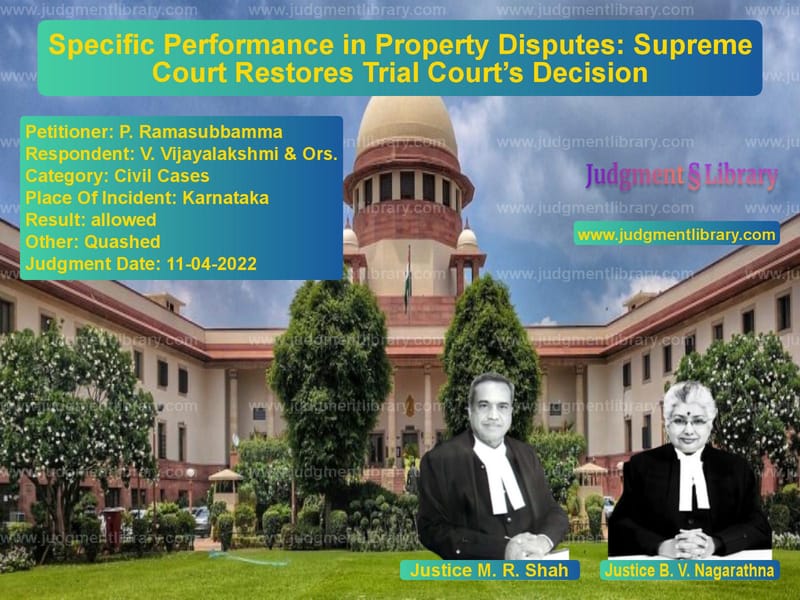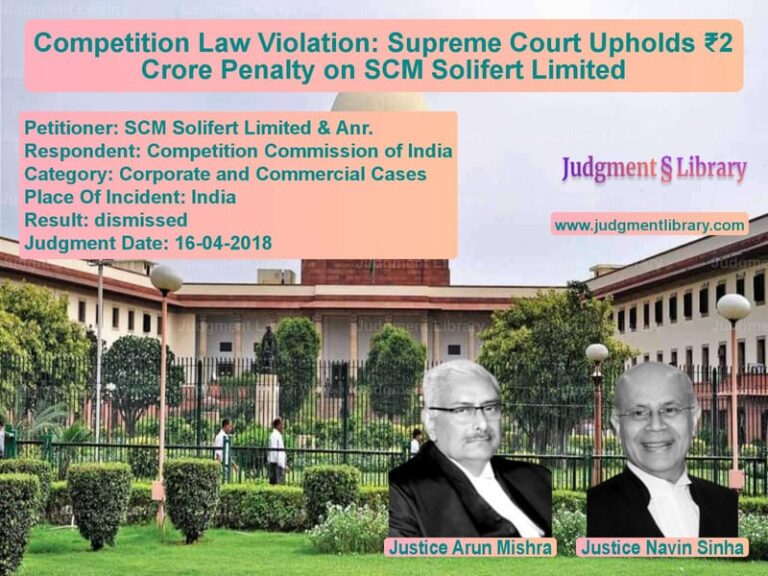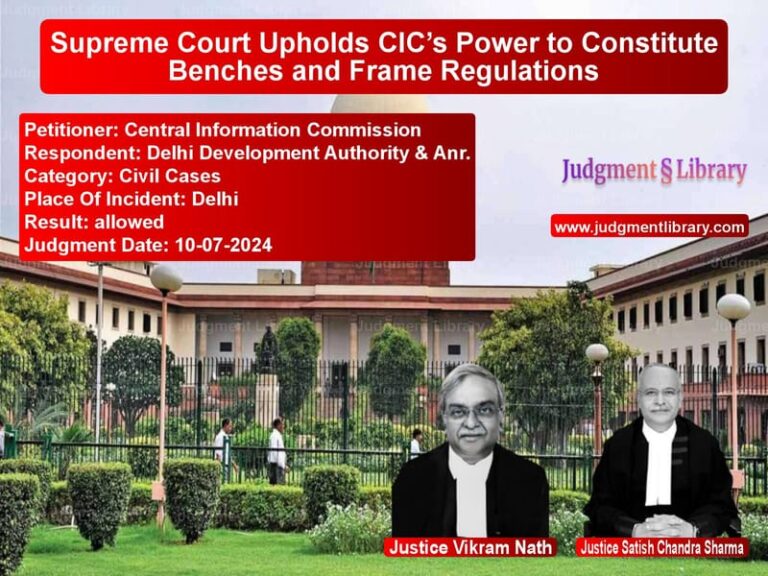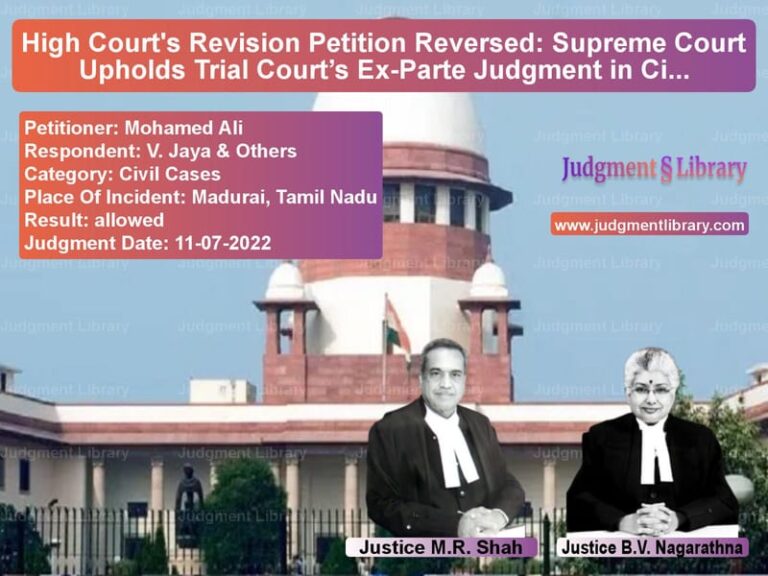Specific Performance in Property Disputes: Supreme Court Restores Trial Court’s Decision
The legal dispute in the case of P. Ramasubbamma vs. V. Vijayalakshmi & Ors. revolves around the enforcement of a specific performance agreement concerning immovable property. This case involves the purchase agreement, execution of sale deeds by an unauthorized party, and the legal battle over ownership rights. The Supreme Court ultimately ruled in favor of enforcing the original agreement, overturning the High Court’s judgment.
Background of the Case
The appellant, P. Ramasubbamma, filed a suit for specific performance based on an agreement to sell dated April 12, 2005. The agreement was entered into with the original owner, defendant No. 1 (V. Vijayalakshmi), for a total sale consideration of Rs. 29 lakhs, out of which Rs. 20 lakhs was paid in advance. Subsequently, an additional amount of Rs. 6 lakhs was paid on March 25, 2008, as endorsed by the seller.
However, despite repeated requests, defendant No. 1 failed to execute the sale deed. The plaintiff later discovered that defendant No. 2, who held a power of attorney from defendant No. 1, had executed sale deeds in favor of defendant Nos. 3 and 4. Believing this to be a fraudulent transaction intended to deprive her of her rights, the plaintiff filed a legal notice on June 17, 2010, demanding execution of the sale deed. Since there was no compliance, she moved to the Trial Court seeking specific performance.
Legal Issues Raised
The Trial Court framed multiple issues, the primary ones being:
- Whether the plaintiff could establish the existence of a valid agreement to sell dated April 12, 2005?
- Whether the plaintiff had paid the advance amount as claimed?
- Whether the plaintiff was ready and willing to perform her part of the contract?
- Whether the sale deeds executed in favor of defendant Nos. 3 and 4 were fraudulent?
- Whether the plaintiff was entitled to a decree for specific performance?
Trial Court’s Findings
The Trial Court ruled in favor of the plaintiff, holding that:
- The agreement to sell was valid and supported by evidence.
- Defendant No. 1 had admitted the execution of the agreement and receipt of substantial payment.
- The sale deeds executed by defendant No. 2 in favor of defendant Nos. 3 and 4 were not binding as they were meant to defraud the plaintiff.
Consequently, the Trial Court ordered specific performance, directing defendant No. 1 to execute the sale deed in favor of the plaintiff and declared the sale deeds executed by defendant No. 2 as null and void.
High Court’s Reversal
Aggrieved by this judgment, defendant Nos. 3 and 4 appealed to the Karnataka High Court, which overturned the Trial Court’s decree. The High Court reasoned that:
- The plaintiff had failed to seek explicit cancellation of the sale deeds executed in favor of defendant Nos. 3 and 4.
- The discretionary nature of specific performance under Section 20 of the Specific Relief Act allowed the High Court to deny relief.
- The agreement to sell was not properly substantiated in the absence of defendant No. 2’s acknowledgment.
Supreme Court’s Decision
The Supreme Court, comprising M. R. Shah and B. V. Nagarathna, restored the Trial Court’s judgment and held:
“Considering the fact that the original owner (defendant No. 1) admitted the execution of the agreement to sell and receipt of advance payment, there was no reason to doubt the plaintiff’s claim. The High Court erred in interfering with the Trial Court’s well-reasoned order.”
Key takeaways from the ruling include:
- When a seller admits to an agreement and receipt of payment, further proof is unnecessary.
- Subsequent fraudulent sales do not override the rights of a party holding a legitimate agreement to sell.
- Discretion under Section 20 of the Specific Relief Act must be exercised judicially, not arbitrarily.
Final Judgment
The Supreme Court quashed the High Court’s order, reinstating the Trial Court’s ruling in favor of the plaintiff. The defendants were directed to comply with the decree within twelve weeks.
This judgment reaffirms the importance of upholding contractual obligations and protects property buyers from fraudulent transactions.
Petitioner Name: P. Ramasubbamma.Respondent Name: V. Vijayalakshmi & Ors..Judgment By: Justice M. R. Shah, Justice B. V. Nagarathna.Place Of Incident: Karnataka.Judgment Date: 11-04-2022.
Don’t miss out on the full details! Download the complete judgment in PDF format below and gain valuable insights instantly!
Download Judgment: p.-ramasubbamma-vs-v.-vijayalakshmi-&-o-supreme-court-of-india-judgment-dated-11-04-2022.pdf
Directly Download Judgment: Directly download this Judgment
See all petitions in Property Disputes
See all petitions in Specific Performance
See all petitions in Damages and Compensation
See all petitions in Judgment by Mukeshkumar Rasikbhai Shah
See all petitions in Judgment by B.V. Nagarathna
See all petitions in allowed
See all petitions in Quashed
See all petitions in supreme court of India judgments April 2022
See all petitions in 2022 judgments
See all posts in Civil Cases Category
See all allowed petitions in Civil Cases Category
See all Dismissed petitions in Civil Cases Category
See all partially allowed petitions in Civil Cases Category







